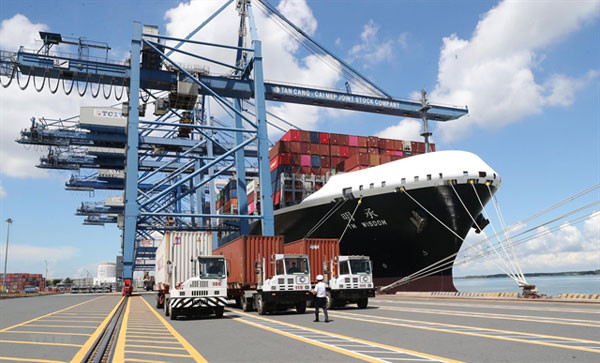
The first quarter saw positive results in exports and imports with a trade revenue of $176 billion, representing a rise of 14.4 per cent against the same period last year.
Nguyen Thuong Lang from the National University of Economics predicted the trade revenue could even reach $750 billion.
Tran Thanh Hai, Deputy Director of the Import-Export Department, said the largest opportunity was coming from recent FTAs with a high level of commitment, including the Comprehensive and Progressive Trans-Pacific Partnership, EU-Vietnam FTA, UK-Vietnam FTA and the Regional Comprehensive Economic Partnership (RCEP).
Specifically, the RCEP, which took effect at the beginning of this year, will create more favourable conditions for enterprises to promote exports and participate deeper in the global supply chains.
Major markets like the US, EU, South Korea, and Japan increased their imports of Vietnamese goods. The US was the largest export market of Vietnam in the first quarter of this year, with a revenue of $25.57 billion, up by 15 per cent from the same period last year.
Exports to the US reached $11.21 billion, up 16.3 per cent, ASEAN $8.1 billion, up by 19.9 per cent, South Korea $6.26 billion, up 21 per cent and Japan $5.4 billion, up 10.6 per cent.
The production capacity for exports also had plenty of room for growth this year, with several enterprises investing in expanding production and consolidating the position of Vietnam as an irreplaceable link in the global value chain.
Hai, however, noted that the impact of the COVID-19 remained a difficulty. Although Vietnam was implementing policies of safe adaptation to the virus and restoring production, the effect of the virus in other markets might affect Vietnam, including China which was a large supplier.
Another difficulty was skyrocketing marine transportation fees. The conflict between Russia and Ukraine also affected global commodities prices. Although Vietnam’s trade with Ukraine and Russia remained modest, these two countries supplied basic raw materials and agricultural products.
The industry and trade ministry targeted that Vietnam would maintain a trade surplus this year and export would grow by 6-8 per cent to reach around $363 billion, Hai said, adding that providing market and trade policies information would be necessary so that enterprises could take opportunities arising from FTAs.
The ministry developed some websites to provide information to enterprises. Especially the Vietnam National Trade Repository was officially launched at the end of March, a free-to-access online portal that provided all the latest trade information.
A former senior researcher at the Trade Research Institute, Pham Tat Thang, said trade, especially exports, would be hit by high production costs due to soaring fuel prices.
Therefore, in addition to taking full advantage of FTAs, businesses also needed to focus on solutions to manage risks, minimise external impacts, and promote digital and circular economies.
Robust Q1
Both imports and exports rose strongly in the first quarter.
Total trade is estimated at US$176.35 billion, up 14.37 per cent year-on-year, with exports rising by 12.9 per cent to $88.58 billion and imports by 15.9 per cent to $87.77, according to the latest updates of the General Statistics Office.
Most key exports achieved high growth, helping the trade balance climb into positive territory.
Vietnam has been using new-generation FTAs that have taken effect, such as the EU-Vietnam Free Trade Agreement, the UK-Vietnam Free Trade Agreement and the Comprehensive and Progressive Agreement for Trans-Pacific Partnership, according to the Agency of Foreign Trade.
Both export volumes and value were up, especially for agricultural produce, crude oil, fertilisers, and plastics.
Another 16 products joined the $1 billion list, in which five saw exports of more than $5 billion.
Vietnam’s trade totalled nearly $670 billion in 2021, up by 22.6 per cent against 2020. The country ran a trade surplus of around $4 billion last year.
Source: Vietnam News